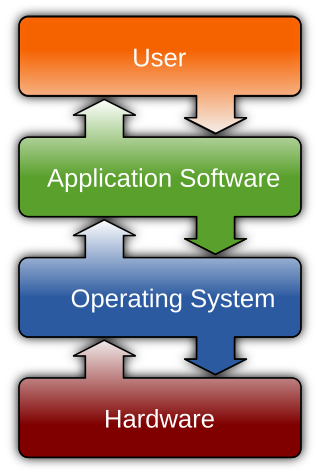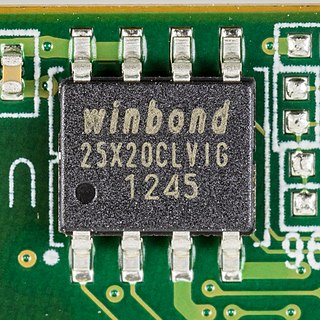Related Research Articles

In computing, BIOS is firmware used to provide runtime services for operating systems and programs and to perform hardware initialization during the booting process. The BIOS firmware comes pre-installed on an IBM PC or IBM PC compatible's system board and exists in some UEFI-based systems to maintain compatibility with operating systems that do not support UEFI native operation. The name originates from the Basic Input/Output System used in the CP/M operating system in 1975. The BIOS originally proprietary to the IBM PC has been reverse engineered by some companies looking to create compatible systems. The interface of that original system serves as a de facto standard.

Software is a collection of programs and data that tell a computer how to perform specific tasks. Software often includes associated software documentation. This is in contrast to hardware, from which the system is built and which actually performs the work.

Free software, libre software, or libreware is computer software distributed under terms that allow users to run the software for any purpose as well as to study, change, and distribute it and any adapted versions. Free software is a matter of liberty, not price; all users are legally free to do what they want with their copies of a free software regardless of how much is paid to obtain the program. Computer programs are deemed "free" if they give end-users ultimate control over the software and, subsequently, over their devices.
Freeware is software, most often proprietary, that is distributed at no monetary cost to the end user. There is no agreed-upon set of rights, license, or EULA that defines freeware unambiguously; every publisher defines its own rules for the freeware it offers. For instance, modification, redistribution by third parties, and reverse engineering are permitted by some publishers but prohibited by others. Unlike with free and open-source software, which are also often distributed free of charge, the source code for freeware is typically not made available. Freeware may be intended to benefit its producer by, for example, encouraging sales of a more capable version, as in the freemium and shareware business models.
Shareware is a type of proprietary software that is initially shared by the owner for trial use at little or no cost. Often the software has limited functionality or incomplete documentation until the user sends payment to the software developer. Shareware is often offered as a download from a website. Shareware differs from freeware, which is fully-featured software distributed at no cost to the user but without source code being made available; and free and open-source software, in which the source code is freely available for anyone to inspect and alter.

In computing, firmware is software that provides low-level control of computing device hardware. For a relatively simple device, firmware may perform all control, monitoring and data manipulation functionality. For a more complex device, firmware may provide relatively low-level control as well as hardware abstraction services to higher-level software such as an operating system.

Unified Extensible Firmware Interface is a specification that defines the architecture of the platform firmware used for booting the computer hardware and its interface for interaction with the operating system. Examples of firmware that implement the specification are AMI Aptio, Phoenix SecureCore, TianoCore EDK II, InsydeH2O. UEFI replaces the BIOS which was present in the boot ROM of all personal computers that are IBM PC compatible, although it can provide backwards compatibility with the BIOS using CSM booting. Intel developed the original Extensible Firmware Interface (EFI) specification. Some of the EFI's practices and data formats mirror those of Microsoft Windows. In 2005, UEFI deprecated EFI 1.10.

Walnut Creek CDROM Inc. was an early provider of freeware, shareware, and free software on CD-ROMs. The company was founded by Bob Bruce in Walnut Creek, California, in August 1991. It was one of the first commercial distributors of free software on CD-ROMs. The company produced hundreds of titles on CD-ROMs, and ran the busiest FTP site on the Internet, ftp.cdrom.com, for many years.

Wireless network cards for computers require control software to make them function. This is a list of the status of some open-source drivers for 802.11 wireless network cards.
In the context of free and open-source software, proprietary software only available as a binary executable is referred to as a blob or binary blob. The term usually refers to a device driver module loaded into the kernel of an open-source operating system, and is sometimes also applied to code running outside the kernel, such as system firmware images, microcode updates, or userland programs. The term blob was first used in database management systems to describe a collection of binary data stored as a single entity.

FreeBSD is a free and open-source Unix-like operating system descended from the Berkeley Software Distribution (BSD). The first version of FreeBSD was released in 1993 developed from 386BSD and the current version runs on x86, ARM, PowerPC and RISC-V processors. The project is supported and promoted by the FreeBSD Foundation.
The following outline is provided as an overview of and topical guide to free software and the free software movement:
Proprietary firmware is any firmware that has had its use, private modification, copying, or republishing restricted by the producer. Proprietors may enforce restrictions by technical means, such as by restricting source code access, firmware replacement restrictions, or by legal means, such as through copyright and patents. Alternatives to proprietary firmware may be free (libre) or open-source.
BSD licenses are a family of permissive free software licenses, imposing minimal restrictions on the use and distribution of covered software. This is in contrast to copyleft licenses, which have share-alike requirements. The original BSD license was used for its namesake, the Berkeley Software Distribution (BSD), a Unix-like operating system. The original version has since been revised, and its descendants are referred to as modified BSD licenses.
Intel PRO/Wireless is a series of Intel wireless products developed by Intel. These products include wireless network adapters, access points, and routers that are designed to provide high-speed wireless connectivity for computers, laptops, and other devices. Intel PRO/Wireless products use various wireless technologies, including Wi-Fi and Bluetooth, to provide wireless connectivity. Intel PRO/Wireless network adapters allow devices to connect to wireless networks, while access points and routers create wireless networks that devices can connect to.

According to the Free Software Foundation Latin America, Linux-libre is a modified version of the Linux kernel that contains no binary blobs, obfuscated code, or code released under proprietary licenses. In the Linux kernel, they are mostly used for proprietary firmware images. While generally redistributable, binary blobs do not give the user the freedom to audit, modify, or, consequently, redistribute their modified versions. The GNU Project keeps Linux-libre in synchronization with the mainline Linux kernel.
The following outline is provided as an overview of and topical guide to software:

Software categories are groups of software. They allow software to be understood in terms of those categories, instead of the particularities of each package. Different classification schemes consider different aspects of software.
A free license or open license is a license which allows others to reuse another creator’s work as they wish. Without a special license, these uses are normally prohibited by copyright, patent or commercial license. Most free licenses are worldwide, royalty-free, non-exclusive, and perpetual. Free licenses are often the basis of crowdsourcing and crowdfunding projects.
References
- 1 2 3 "rum-license (covers rum-rt2573 for rum(4), as well as run-rt2870 and run-rt3071 for run(4))". BSD Cross Reference, OpenBSD src/sys/dev/microcode/rum/.
- 1 2 "ipw.4 – Intel PRO/Wireless 2100 IEEE 802.11b wireless network device, Sh FILES". BSD Cross Reference, OpenBSD share/man/man4/. 2014-02-15. Retrieved 2014-12-28.
These firmware files are not free because Intel refuses to grant distribution rights without contractual obligations. As a result, even though OpenBSD includes the driver, the firmware files cannot be included and users have to find these files on their own. The official person to state your views to about this issue is majid.awad@intel.com.
See also: ipw, iwi, wpi and iwn.